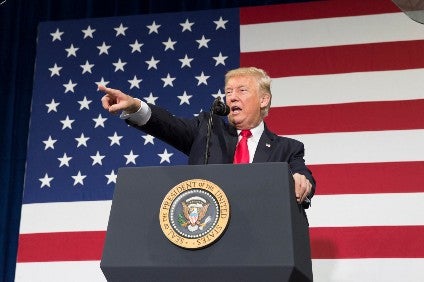
US retailers say proposed legislation that would expand President Donald Trump’s ability to increase import tariffs in response to foreign trade barriers is the “exact opposite” of what Congress should be focusing on.
The United States Reciprocal Trade Act, which was tipped to be introduced yesterday (17 January) by Representative Sean Duffy, would effectively give the president unilateral authority to increase tariffs on imports from any foreign country.
Trump has already used existing trade laws to raise tariffs on steel and aluminum imports from virtually all countries on national security grounds as well as thousands of products from China due to the country’s policies on technology transfer, intellectual property, and innovation. The President has also threatened to further increase tariffs on hundreds of billions of dollars’ worth of imports from China.
“At a time when American businesses and families are suffering under unilateral tariffs imposed by the administration, Congress should be working to protect local communities from an escalated trade war,” says National Retail Federation (NRF) senior vice president for government relations, David French.
“This misguided legislation would do the exact opposite, giving the executive branch limitless power to raise taxes in the form of tariffs. Congress has already ceded far too much of its clear constitutional authority over tariffs, and we are witnessing the consequences unfold across the country.
“The idea that Congress would make matters even worse by further abdicating its role on trade policy is simply unconscionable. The administration and Congress should focus on enhancing market opportunities and reducing trade barriers around the world through trade negotiations, not through tariffs.”

US Tariffs are shifting - will you react or anticipate?
Don’t let policy changes catch you off guard. Stay proactive with real-time data and expert analysis.
By GlobalDataThe US Chamber of Commerce is also understood to have opposed the bill, as has Senate Finance Committee chairman Charles Grassley.
According to international trade law firm Sandler, Travis & Rosenberg (ST&R), the Chamber “strongly opposes” the bill because “tariffs are taxes, and they are paid by American families and American businesses.”
In a letter to members of the House of Representatives, the Chamber explained that many US manufacturers depend on foreign sources for materials and components not available domestically or only available in limited quantities or at high prices, ST&R said.
As a result, further tariff hikes, not to mention the likely “massive tariff retaliation” from foreign trading partners, would undermine US competitiveness, dampen economic growth, and chill job creation. The bill also raises constitutional concerns, the Chamber said, because it would “abdicate to the executive the extraordinary Congressional power to impose tariffs with no meaningful limit on the President’s discretion.”
Prospects for congressional passage of the bill – if and when it is introduced – already appear dim, ST&R said, adding the House now features a majority of Democrats who are likely disinclined to give the president additional executive power. The firm also notes chairman Grassley has similar reservations, telling reporters recently “we ain’t going to give him any greater authority” and “we already gave him too much.”



